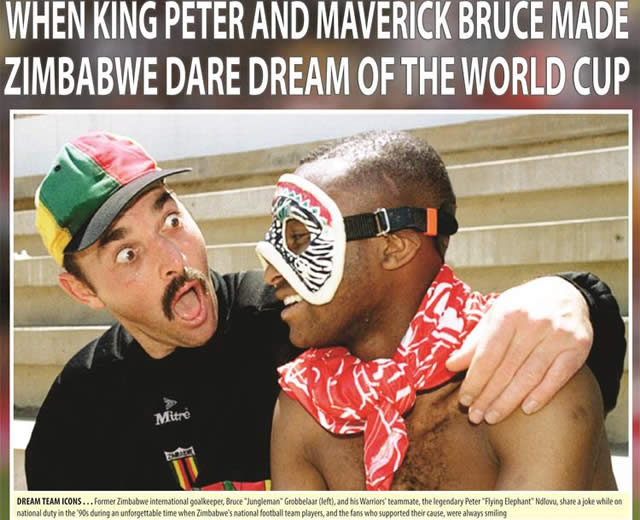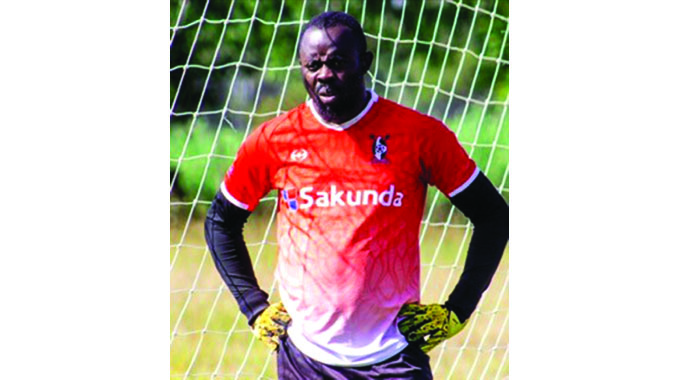When King Peter and maveerick bruce made zim dare dream of the World Cup


LONDON. — About 20 years ago, Zimbabwe’s most famous sporting brothers — a step ahead of the cricketing Flowers, or the tennis-playing Blacks — were spearheading what is now looked on as the nation’s finest era in its most popular sport. Mention the Dream Team in Zimbabwe and you shorthand the young Ndlovus up front, a rugged back four and one of football’s most charismatic goalkeepers.
The Dream Team have an almost folkloric status, although they would fall just short of realising the aspirations they sustained over 15 months, of reaching a World Cup.
The tag Dream Team would first be hung on them during the southern hemisphere winter of 1992, a sobriquet borrowed from the US basketball team at the Barcelona Olympics, an assembly of NBA superstars plunged into Games that had just discarded the pretence of amateurism.
Zimbabwe’s football had a sense that it too might draw on an unprecedented expertise from one of the sport’s most glamorous professional structures — the English League.
From the vantage point of today’s Premier League, in which almost every team has, at least, one African in its line-up, it seems remarkable that in 1992, when the Premier League began, the two established African stars of the top-flight of English football were both Zimbabwean.
Peter Ndlovu, quick, surprisingly sturdy in possession, and a nimble opponent for many English centre-halves, had been spotted by Coventry City when they toured Zimbabwe as part of pre-season training.
Bruce Grobbelaar’s route to the dominant English club of that era, Liverpool, from his beginnings at the same Highlanders club as Ndlovu later joined, had been more circuitous, via South Africa and Canada in the late 1970s.
His relationship with his national team was complicated, and resolving it would provide an element of suspense in the prelude to the Dream Team’s adventure.
In the summer of 1992, Grobbelaar was at a club career crossroads.
After a decade of mostly unchallenged ownership of the No.1 jersey at what had been England’s number one club — a period of six league titles, a European Cup and half a dozen winners’ medals from the major domestic Cups — Grobbelaar was told his Anfield status was threatened.
Liverpool had just expensively recruited David James.
And on the very weekend the new Premier League was to kick off, he was offered an alternative to sitting on the bench understudying James.
For the first time, after several years of absence from international football, the maverick Grobbelaar answered a call-up from his national team with an enthusiastic “Yes.”
Grobbelaar flew out of Merseyside on the Thursday night, three days before the opening match of the 1994 Africa Cup of Nations qualifiers.
He passed through customs at Harare airport using the British passport he had obtained in the early 1980s, by virtue, in common with many of the small but significant minority of white Zimbabweans, of some British ancestry somewhere in the boughs of his family tree.
Grobbelaar had not played for his country for a decade.
Grobbelaar wanted in.
Zimbabwe’s new head coach, Reinhard Fabisch, made it clear he wanted his best goalkeeper in the team.
The people wanted Bruce.
The fixture in which he might make his come-back was especially resonant.
Zimbabwe were to begin their qualifying campaign for the 1994 Cup of Nations against their neighbours South Africa, who would be competing for the first time in Africa as a FIFA-authorised national team after decades of anti-apartheid sanctions.
It was a South Africa team endorsed by the president-in-waiting Nelson Mandela, an XI of black, white and mixed-race South Africans, emblematic of their Rainbow Nation.
For Zimbabwe, the inclusion of Grobbelaar — a man who once fought as a Rhodesian army conscript in the civil war against President Mugabe’s freedom fighters — made its own statement about their diversity.
“Even two days ahead of the game, the government were saying Bruce’s Zimbabwean passport and his eligibility were down to the Home Office,” remembers Pernell McKop, “so they used it, to hype up the suspense, kept saying ‘it’s touch and go’ whether he could play.”
Naturally, he did.
And on a sunny winter day at Harare’s National Stadium, the Dream Team gained its traction. Grobbelaar had a sense this might be a watershed match for his country.
“When I got the call to come back, to play against South Africa, I was thrilled,” he recalls. “I knew they’d be really up for it and it would be a helluva game.”
The visitors thought they were the big storyline.
Fabisch played up the cowing, underdog status of Zimbabwe — “they are much stronger than us” — though not all his players did.
Willard Khumalo, the Zimbabwe midfielder, gave a gem of a quote to those of us covering the game.
Asked his opinion of South Africa’s insatiably showy trickster of a winger, “Doctor” Khumalo of Kaizer Chiefs, the Khumalo of Zimbabwe suggested the Khumalo of South Africa risked having to “change his name from ‘Doctor’ to ‘Nurse’.”
In front of a crowd of more than 40 000, Zimbabwe demolished South Africa.
They went 2-0 up thanks to goals from Vitalis “Digital” Takawira and Rahman Gumbo in the opening 20 minutes, and were 4-1 winners.
Peter Ndlovu, still a teenager, got the other two goals.
The Dream Team had lift-off. David had whipped one self-styled Goliath of the continent. Over the months that followed they would aim their slingshots at genuine giants of African football as they picked their way through the cluttered calendar.
Besides the Cup of Nations qualifiers, there was the qualifying marathon for the USA World Cup, with its two tiers of group phases, with only the top team going through at each stage.
In the course of those, Zimbabwe would be required to keep their poise on some demanding away trips — notably to Angola, in the first World Cup mini-league, on a baking January day during the Angolan civil war.
“Coming into Luanda, we had to circle all the way down into the airport because someone was shooting at planes,” recalls Grobbelaar.
“In the stadium, they must have had 80 000. It was only supposed to hold about 50,000.”
A 1-1 draw felt plucky.
Three weeks earlier, Egypt had been beaten in Harare, a peg on the Dream Team’s highway as significant as the resonant rout of the South Africans.
Peter Ndlovu’s slalom and left-foot drive for the first goal in the 2-1 win had been the highlight.
It set up a rousing conclusion to the group, with Zimbabwe needing a point in Cairo to go through to the next phase and eliminate the Pharaohs.
By the end of an intense, rowdy night, Fabisch had a cut to his head and Grobbelaar had also been struck by a missile. Egypt had won 2-1.
Zimbabwe, armed with television footage, appealed to FIFA. The world governing body’s record on righting perceived wrongs caused by lax security, particularly in Africa, is a little haphazard.
Yet the Dream Team were awarded a replay of the match, to be played in Lyon, France.
Grobbelaar had one of the finest nights of his international career in a 0-0 draw that was vividly celebrated 5 000 miles away.
Back home, bad drought was hurting the population and wearing at the country’s economy. “Morale was low at that time,” says McKop, “and people clung to the idea of the Dream Team and the road to the USA, and to what we felt might be our first time at an Africa Cup of Nations.
“When we played those qualifiers, started to put together an unbeaten run, those days brought back some of the joy of independence, the feeling of all having a single objective. I think that’s partly why the Dream Team label stuck.”
Zimbabwe’s Cup of Nations qualifying campaign would by the middle of 1993 be overshadowed by a bigger story.
When Zambia came to Harare for the final group match, needing a draw to pip the Dream Team for a place at the finals, they had the sympathy and support of the world.
Three months earlier the Zambia squad travelling to a match in Senegal had been killed in a plane crash. Against Zimbabwe, a hastily patched-together side fell a goal behind.
The Dream Team were on course for their first major tournament. Eleven minutes remained when the Zambia captain Kalusha Bwalya directed a header past Grobbelaar.
The road to the USA remained open.
To add to the scalp of Egypt, there would be the cutting down to size of Cameroon, Africa’s most visible football power thanks to Italia 90, beaten 1-0 in Harare.
But Zimbabwe had dropped points with a defeat in Guinea, they also-rans in their mini-league. After the penultimate set of fixtures of the second group phase, Zimbabwe found themselves again one win shy of the target.
They had to go to Yaoundé and beat the Indomitable Lions to be one of the trio of African sides at the 1994 World Cup.
For a while, the dream flickered on.
When, five minutes into the second half, Adam Ndlovu scored, a hush came over the Ahmadou Ahidjo Stadium.
A brief respite from a noise Grobbelaar describes as “like a swarm of angry bees, ringing in your ears.” But Cameroon were already two goals up by then.
Once they added a third, Zimbabwe were broken.
On the touchline, Fabisch started throwing US dollar bills around, implying the referee, who had given a contentious early penalty in favour of Cameroon, had been bought.
Zim’s Dream Team had been 11 minutes from a first ever Cup of Nations. They had been one win from reaching the US.
They had neither. — The Guardian








Comments